I’m not lucky in many ways but one thing I am fortunate in is that I really know what sort of movies I like. What I like is something substantial and thoughtful. The majority of films I see advertised at the cinema do exactly what they are supposed to do… show potential audiences the film but with me, it only serves as a reminder that I should never ever go watch a particular movie.
I just know what films I will like, the previous week I went to see Silence which is getting lots of bad reviews. I went to see it on the strength of a negative written review that I read at 9am and by 9.20am I was watching and I loved it as I knew I would.
I really like foreign language films and those that feature different cultures as I feel that only by opening up and immersing oneself in different parts of the world can you really get to know yourself more fully and hope to understand and enjoy things outside your immediate horizon. Perhaps that is part of why I loved the film Arrival so much and how I guessed the intriguing plot so early on, I really enjoy thinking laterally and enjoying the subtleties of communication.
So a few days ago I became aware of a film entitled Lion and it immediately went to the top of my must-see list. Much of it seemed to be set in India and in foreign languages which was a huge plus point to me and the story seemed amazing. It just seemed like my sort of film. I must say, I’m not at all a fan of Bollywood. Growing up in the U.K. it was relatively easy to find cheap Indian movies and tv serials on and I didn’t like the overly dramatic nature of them or all that dancing and shooting and budget special effects. That’s
I must say, I’m not at all a fan of Bollywood. Growing up in the U.K. it was relatively easy to find cheap Indian movies and tv serials on and I didn’t like the overly dramatic nature of them or all that dancing and shooting and budget special effects and fighting sequences. That’s ok though, I hate most Hollywood movies and culture too and I definitely don’t appreciate much popular contemporary British stuff either. Lion though looked like it would get behind the fakery and tell a true-life story in human way.
The story starts with a little boy named Saroo and his older brother Guddu. They have one of those lovely brotherly relationships and are truly inseparable. Sadly they are very nearly at the bottom of the social ladder, without a father and with a loving but desperately impoverished mother, forced to break and carry rocks at a quarry. As such the boys have to look after their baby sister whilst also contributing to the family kitty by doing legitimately back breaking work some days or doing dangerous and criminal activities the next, such as jumping onto trains to steal a few bricks of coal before jumping off, walking miles back to home to sell their ill-gotten gains for just a few pennies.
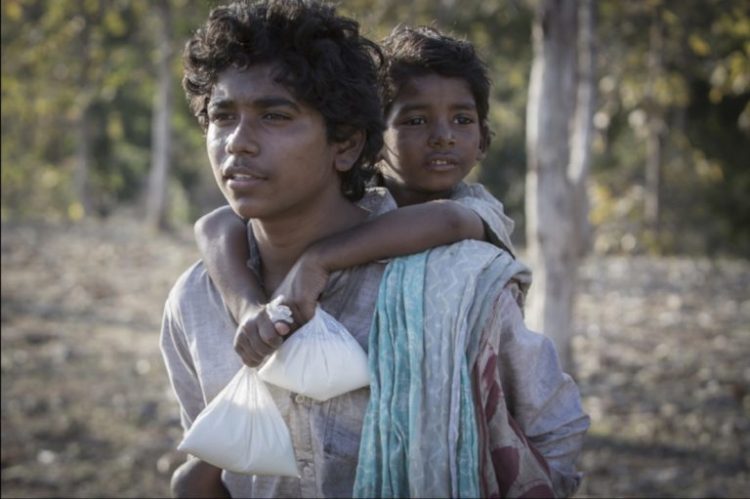
One evening Guddu has to go out to work and his lovely but persistent brother insists that he comes along too as he wants to help as he believes he can do anything his older sibling can. By nightfall, Saroo is tired and sleeps on the bench of a local train station whilst his brother tells him not to move as he goes to look for work. Little Saroo, however, wakes up and thinking he may have been forgotten about, wanders around the deserted station before finding a more comfortable neglected train to sleep on.
Terrifyingly, Saroo awakes to find the deserted train is on the move and is helpless to climb out of the locked carriage as it passes across the length and breadth of India all the way to Calcutta which takes several days and nights.
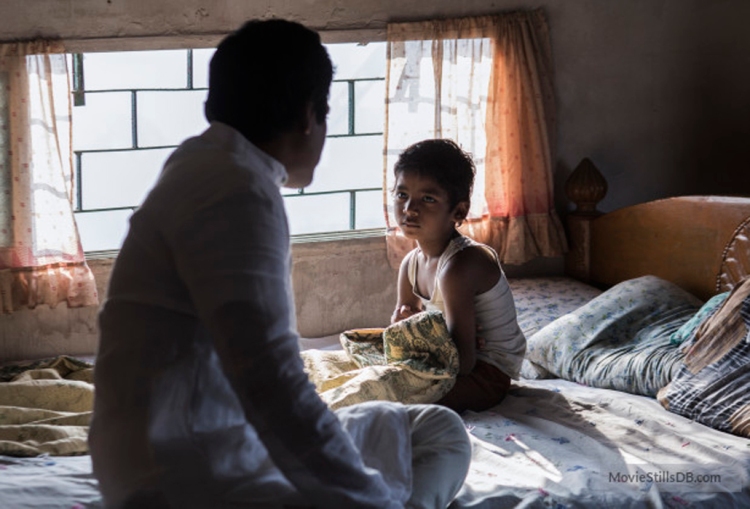
Much of the film then illustrates the terrible traumas that Saroo goes through. He tries to get help from the train station staff but he only speaks Hindi rather than the local language of Bengali. Of course, educated people across India speak English masterfully but little Saroo is illiterate. He doesn’t know his surname, he is mistaken over the name of his village and both the ticket staff and local commuters soon push him out of the way.
Saroo ends up making friends with similarly lost children in the bowels of the station, sleeping on cardboard and picking at items such as apple cores to survive. The gang of children is rounded in the still of the night by some (possibly criminal) men group right under the eyes of police but Saroo escapes and is later befriended by a kindly lady who can speak Hindi. She takes him home and promises him that her male friend will be able to help him but this man is in some sort of paedophile gang from whose clutches Saroo narrowly escapes.
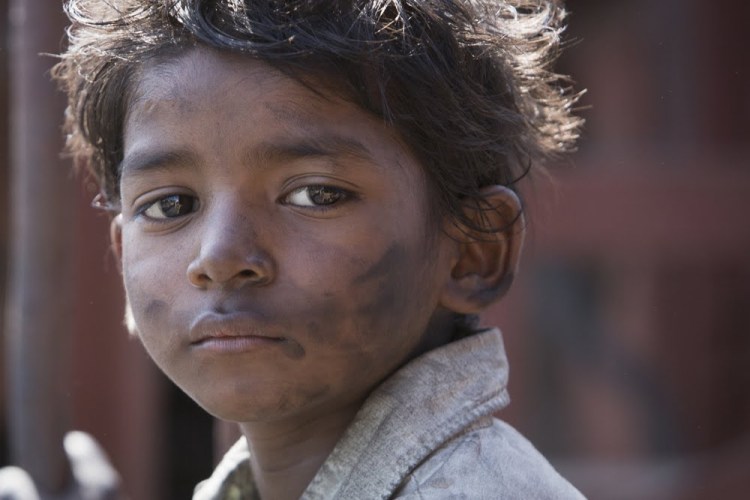
And so Saroo finds himself living on the street and rifling through the rubbish to make ends meet until his fantastic cuteness and playfulness endears him to man in a coffee shop who sets in process a chain of events that sees Saroo in a rather Dickensian home for abandoned or orphaned children. The conditions are terrible and some of the children may even be mentally ill and physically abused but at least they are housed, fed and nominally educated.
The authorities try their best to help Saroo reunite with his beloved Guddu and his mother but they have so little information to go on and of course it is likely his mother is also illiterate. Thankfully for Saroo he isn’t there long and has been earmarked for adoption to a very comfortably off family in Tasmania, Australia. They offer Saroo everything anyone could ever want and after overcoming the initial obvious culture shock, embraces the whole experience. In fact they even arrange for a second Indian boy to come over to be his brother but it turns out the boy who arrives is the one Saroo encountered with behavioural and psychological problems and he doesn’t do so well.
Over 20 years later and Saroo is now an educated and successful young man who has made the most of the opportunities and love given to him. His brother, however, is now something of an anti-social misfit who lives alone in a cabin deep in the woods. Saroo feels strongly that he needs to succeed as a way to give thanks to his adopted parents as well as to help with the heartbreak they must feel about their other son.
In every way, Saroo seems to be a modern and western Australian with only the occasional thought given to his long lost and almost forgotten life. That is until he moves to the big city to further his education and career and comes into contact with people from around the world including India. They pique his curiosity and when he sees an Indian snack in a friends kitchen, one he longed for but could never afford as a boy, he decides to take on the impossible mission of tracking down his family by using Google Earth.
Saroo has strong memories of 2 old water tanks at the train station he was at with Guddu. He works out the average speed of Indian trains in the 1980s and he knows how long he was on the train and so over months and even years, locates every possible train station that he could have originated from. There are hundreds of them and one way or the other, none of them have any water tanks…. if they are even still there.
Saroo lets his adult life fall apart as his obsession takes over and it affects his adopted parents badly, particularly his mother. Saroo goes to visit her, he has long been wanting to tell her why he has ended up how he has but didn’t want to appear ungrateful. In the end he tells her that he loves her so very much and he really appreciates all they have done for him and he is sorry about everything, it being such a shame that they couldn’t have children. His adopted mother, ably played by Nicole Kidman then tells him that the couple could very easily have children but rather than add two more beings to this troubled world, decided it would be much better to help children who had no-one and nothing.
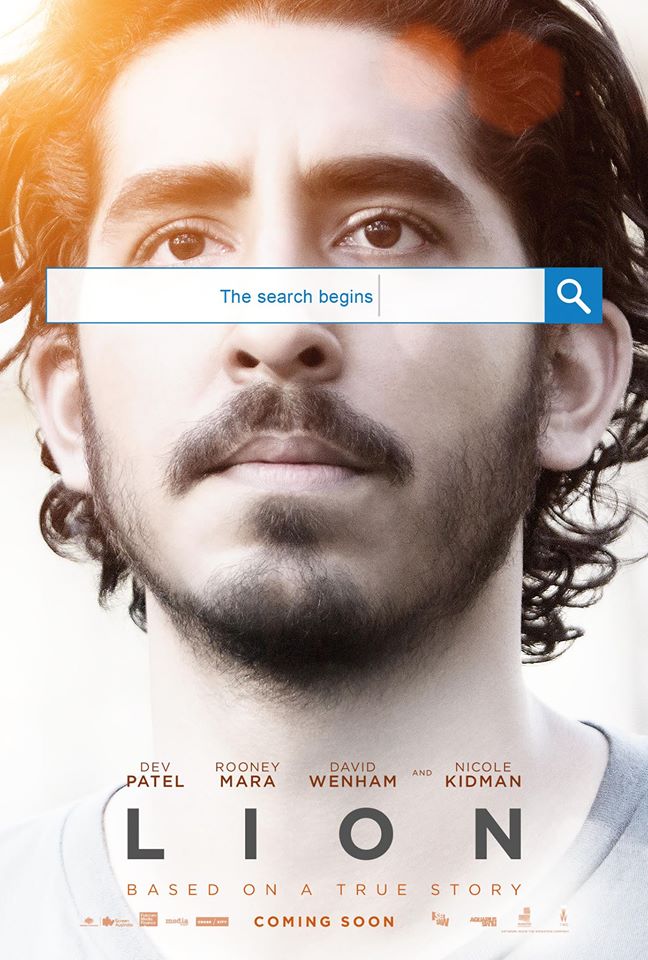 This obviously touches Saroo immensely and he informs his parents of his mission, not that it looks like it will go anywhere but at every moment he is haunted by his missing family. Finally, in a stroke of desperation, he almost at random goes out of his search radius and he finds a train station with the two water towers. Going by hazy memories, he follows the train line and finds the woods and valleys where he lived, the rocky terrain where his mother used to work, the streets of his village… his old house. In fact the village district where he was searching was just a character or so different from the name of the village he remembered all those years ago.
This obviously touches Saroo immensely and he informs his parents of his mission, not that it looks like it will go anywhere but at every moment he is haunted by his missing family. Finally, in a stroke of desperation, he almost at random goes out of his search radius and he finds a train station with the two water towers. Going by hazy memories, he follows the train line and finds the woods and valleys where he lived, the rocky terrain where his mother used to work, the streets of his village… his old house. In fact the village district where he was searching was just a character or so different from the name of the village he remembered all those years ago.
Making peace with his adopted brother who he never really had much time for, Saroo flies over to India and makes the reverse journey back to the train station. The towers are there just as before. He retreads the routes he went with his beloved Guddu, rather standing out from the local villagers. Finally he finds his family home which isn’t really much more than a shack. Terribly it is no longer habitable, his family aren’t there and he isn’t able to communicate with the owner of the property next door.
Thankfully they find a man who can speak English and he leads Saroo through the village and there before his eyes is his elderly mother who not once gave up hope that she would ever see Saroo. His little sister is there too, now all grown up.
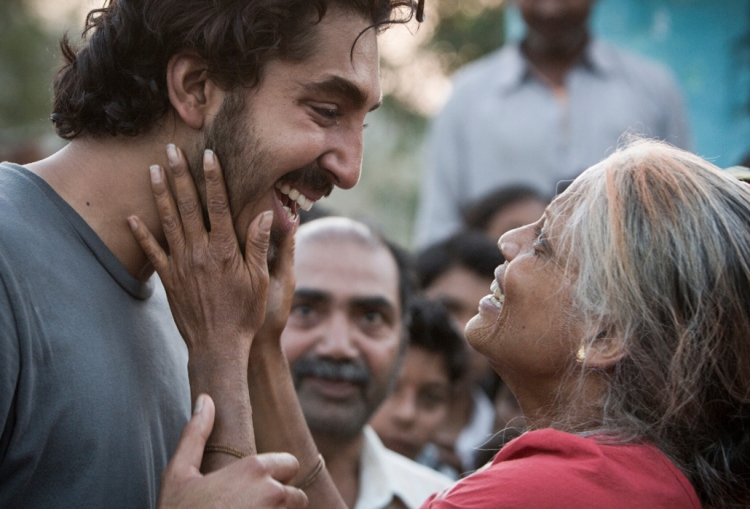
Like Saroo, we wait to see Guddu in the crowd but he is not forthcoming so Saroo asks where his big brother is. He is told that Guddu is no longer on this earth and that he was tragically killed by a train on the tracks that very night Saroo went missing, possibly whilst looking for his baby brother or perhaps before that and that is why Saroo woke up after an unknown passage of time, all alone. Still Saroo had spend 25 years longing for his wonderful brother and he had been dead right from the very start.
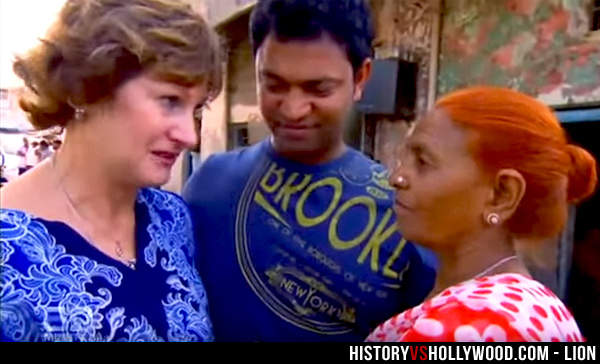
The film concludes with a reminder that this is a very true story and shows footage of the real life Saroo and his adopted mother, meeting his birth mother back in India. In fact Saroo was so illiterate, he didn’t even know what his real first name was. In actuality Saru was actually called Sheru which means Lion. The film ends with a bittersweet dedication and a joyful reminder of Guddu and Saroo running along the roof tops of the train in the tunnel as it emerges into sunlight.
I saw this film on the opening day in the U.K. at 9am, there was only myself and one other person present but I could tell that he loved it just as much as I did. It is quite a genteel film despite some of its unsettling imagery in the first part of the film. Dev Patel is excellent as the adult Saroo but of course the whole film is stolen by little Saroo who is portrayed by 8 year old Sunny Pawar.
The music in the film is excellent and I really enjoyed the ever increasing emotional impact of the film and felt a real connection with Saroo. What you see in the trailer below is definitely what the film is like and it is a beautiful shot film as well. I particularly enjoyed the first third or half of the movie with Saroo in India as a little boy. When the film jumps to the present day, I found it a little jarring as I wasn’t that interested in seeing the life of some wealthy Australians and the going back to English was a bit jarring but thankfully the creators seemed to realise this as it quickly moves on the closing stages and the search the Saroo embarks on.
Lion is an artfully crafted and carefully conceived movie and without doubt it will be the best film I will see in 2017, I hope that it might be yours too. There aren’t many that are both tearjerkers and crowd pleasers, albeit the crowds may only be of two people as in my cinema.
Hi Stephen,
I saw Lion and loved it too. LIke you I was charmed by the little Saroo in India, what a life he had and the fact that he survived was a testament to his courage. I think the little Saroo should have been up for an Oscar as it was a stunning performance but I believe there is an age limit which seems somewhat unfair to me. I have to say that I don’t think Saroo’s adoptive parents were particularly wealthy – I’m not sure what gave you that impression. I hope Lion does well in the Oscars.
I have been off the air for a while but I am back now and look forward to reading more of your blogs, always so interesting.
Cheeres,
Fiona
LikeLiked by 1 person
Hi Fiona, I’m glad that you enjoyed it too. Yes, I feel so sorry for little Saroo and agree the young actor should definitely be up for an actor as really, he was the star.
I think it may be due to the fact that the Australian family had a large house and a sailing boat gave me that impression. I’m aware it is likely that this could be due to housing in London being so expensive that even a garage could cost more than much larger areas in Australia. Maybe I should change it to comfortably middle-class 🙂
Welcome back, I wonder where you’d been!
LikeLike
I must see this it sounds excellent, thanks
LikeLiked by 1 person
It really is good. I’m glad that Dev Patel won the BAFTA for it though really the young boy Sunny is the real star. Thanks for commenting Charlotte!
LikeLiked by 1 person